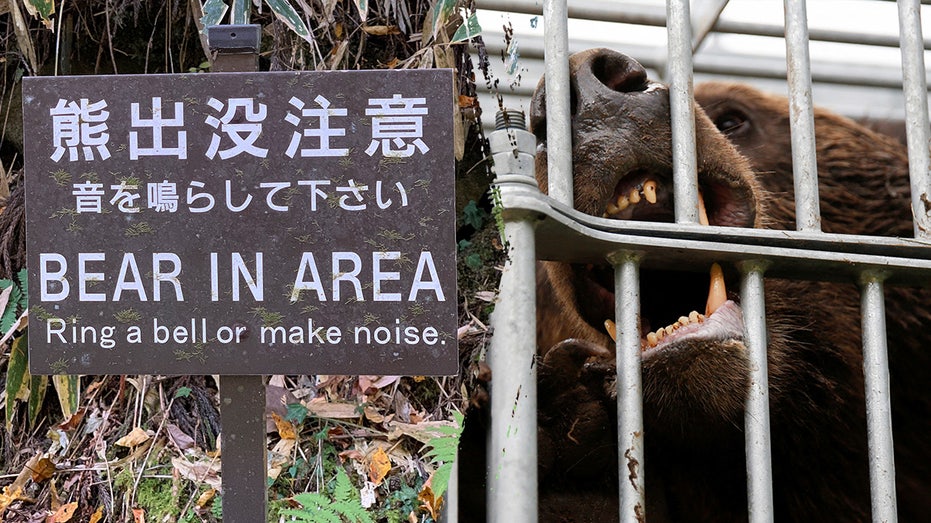Top Stories
Japan Deploys Military as Bear Attacks Surge to Record Highs

UPDATE: Japan is facing an unprecedented crisis as bear attacks soar to record numbers, prompting officials to deploy military assistance across the nation. As of now, at least 12 people have died and over 100 have been injured in bear encounters this year, primarily in northern regions such as Akita, Iwate, and Fukushima.
Authorities are describing this surge in wildlife attacks as Japan’s most severe crisis in decades. In response, the governor of Akita, Norihisa Satake, formally requested the help of the Self-Defense Forces (SDF) to support overwhelmed local agencies. The military’s involvement will focus on noncombat roles, including logistics, such as transporting wildlife carcasses and setting traps in areas where bears have been sighted.
The situation is critical. With bears encroaching upon homes, schools, and shopping districts, many rural towns have been forced into temporary lockdowns to protect residents. The military’s assistance comes as Japan grapples with a declining population of licensed hunters—approximately 60% of them are over the age of 60—leaving communities ill-equipped to manage the escalating wildlife threats.
Local governments in Akita, Niigata, and Hokkaido are stepping up efforts to recruit new hunters by increasing subsidies, training stipends, and offering per-bear bounties. This is a desperate attempt to fill the gaps left by retiring traditional bear trackers, known as matagi, who have historically managed bear populations in rural areas.
Experts attribute the rise in bear encounters to a combination of factors, including poor acorn and beech nut yields, warmer winters delaying hibernation, and depopulation in rural regions leading to unmanaged farmland. Consequently, wildlife experts and officials are reigniting a national debate on how to balance conservation efforts with public safety.
While bears hold a significant place in Japanese folklore, symbolizing strength and endurance, the increase in attacks has sparked urgent calls for stricter control measures. Residents are demanding immediate action, whereas environmental groups advocate for humane strategies and improved forest management rather than mass culling.
Japan’s Environment Ministry is urging citizens to remain cautious. They advise avoiding forest edges, securing garbage, and immediately reporting bear sightings. Although officials frame the crisis as wildlife management rather than a war on bears, the fear among local communities is palpable.
As the situation develops, residents are left grappling with the frightening reality of living in close proximity to these wildlife threats. The government’s response and community actions in the coming days will be critical in determining how this crisis unfolds.
Stay tuned for further updates on this ongoing situation as Japan navigates unprecedented wildlife encounters.
-

 World2 weeks ago
World2 weeks agoGlobal Air Forces Ranked by Annual Defense Budgets in 2025
-

 World2 weeks ago
World2 weeks agoMass Production of F-35 Fighter Jet Drives Down Costs
-

 Top Stories2 weeks ago
Top Stories2 weeks agoNew ‘Star Trek: Voyager’ Game Demo Released, Players Test Limits
-

 Science2 weeks ago
Science2 weeks agoTime Crystals Revolutionize Quantum Computing Potential
-

 Top Stories2 weeks ago
Top Stories2 weeks agoDirecTV to Launch AI-Driven Ads with User Likenesses in 2026
-

 World2 weeks ago
World2 weeks agoElectrification Challenges Demand Advanced Multiphysics Modeling
-

 Lifestyle2 weeks ago
Lifestyle2 weeks agoLia Thomas Honored with ‘Voice of Inspiration’ Award at Dodgers Event
-

 Entertainment2 weeks ago
Entertainment2 weeks agoFreeport Art Gallery Transforms Waste into Creative Masterpieces
-

 Lifestyle2 weeks ago
Lifestyle2 weeks agoDiscover Reese Witherspoon’s Chic Dining Room Style for Under $25
-

 Health2 weeks ago
Health2 weeks agoGavin Newsom Critiques Trump’s Health and National Guard Plans
-

 Entertainment2 weeks ago
Entertainment2 weeks agoFast & Furious Coaster Hits the Track at Universal Studios
-

 Health2 weeks ago
Health2 weeks agoResearchers Uncover New Insights into Cancer Mortality Causes









